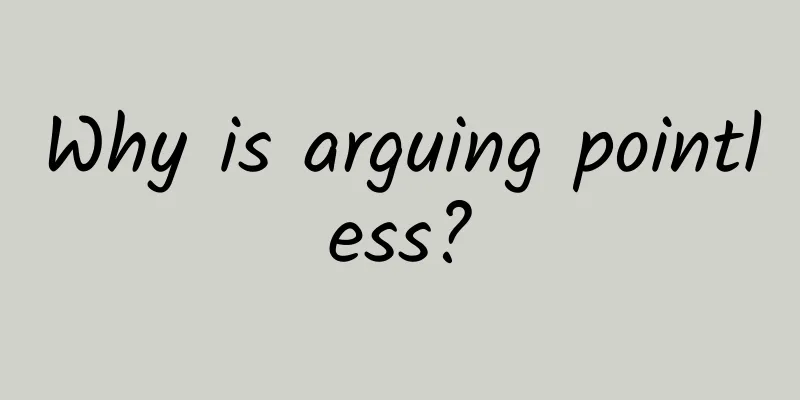Why is arguing pointless?

|
© The Daily Star Leviathan Press: When A says to B, "My headache is really unbearable." B responds, "I have headaches just like you." Are the headaches A and B are talking about the same thing? Some people may think without hesitation that they are the same thing. But please note that as long as pain is an internal experience of an individual, it cannot be ruled out that the pain expressed through language is different from the pain described by others. The reason why B thinks that he has the same headache as A is, in a sense, just confirmation bias, a self-prediction of the fact of pain, an internal experience. In daily life, many of our conversations and even arguments often ignore the premise of the discussion. People with different preconceived opinions think they are right, and thus argue until they are red in the face and leave unhappily. Even in the best case, if one party convinces the other, does it really mean that the former has won? Is the truth behind the opinion necessarily like this? When was the last time you had a debate, an argument, or just a simple conversation with someone, but the other party didn't understand what you were saying at all? Chances are you misled your audience, so you try to rephrase, slow down, and say it again, but after repeating it over and over again, eventually, your words are misunderstood and wrongly summarized. I usually give in. There's no point. Psychologists like to blame this on our biases. For example, confirmation bias causes us to listen to and prefer information that confirms our prior beliefs. In a conversation, it causes us to interpret the speaker's words according to our preconceptions about them. And there's nothing wrong with that. The Chinese Taoist philosopher Zhuangzi had a different explanation. He believed that our means of communication - language - is inherently limited. We can only convey our thoughts and ideas so far, and it is futile to go further. Who is right? Who is wrong? Intuitively, we think that consensus implies truth. If you and I disagree on a topic, we can find a third person to resolve our disagreement. Whoever she agrees with is (mostly) right. We can go a step further from this. For example, if 98 out of 99 people agree with you, that means you are probably right. I am probably wrong. This is truth by consensus. But everyone should know that consensus does not necessarily mean truth. In the Theaetetus, Socrates argues that anyone with a persuasive mind can muster a group of supporters for your claims—even if those claims are not true: "Therefore, when judges are convinced by fair statements, accept true opinions, and make judgments about things that cannot be known without seeing, even if the judgments are appropriate, they are not made based on knowledge, but because they are correctly persuaded." - "Theaetetus" The dialogue between Socrates and Theaetetus is usually interpreted as a dialogue about knowledge. In this passage, Socrates tries to distinguish between "truth" and "knowledge". He believes that a person can grasp the "truth" without "knowing". Suppose there is a "truth," say, "Jupiter exists." Although you have never seen Jupiter yourself, you have seen enough photos of Jupiter and enough scientific explanations of its existence to believe it exists. In this sense, a person can grasp the "truth" through rhetoric. A person can be persuaded to believe a truth without having gone through the process of learning that truth. © Foundation for Economic Education But Zhuangzi went further. He believed that no one could truly grasp the "truth" through rhetoric. No one could be truly persuaded to believe the truth. “If you and I were to argue, and you beat me, but I am not as good as you, is this true? Or am I not? I beat you, but you do not beat me, is this true? Or am I not? Is it true or is it not? Are we both true or are we both not? If you and I cannot understand each other, then we are bound to suffer from the darkness. Who can correct us?” — Zhuangzi, “On the Equality of Things” Bryan van Norden (translator’s note: contemporary sinologist) notes that the ambiguity between “winning” and “losing” actually makes Zhuangzi’s argument stronger. Let's assume that "winning" means "successfully convincing the other party." So, if someone is convinced that "the earth is round," does this really mean that the earth is round? Zhuangzi believed that if we believe the truth through being persuaded, what we actually have is just a version or interpretation of the truth. If you persuade me that the earth is round, then what I have is your version of the truth. Of course, scientists (especially verificationists) will say, "Why don't we let other people verify this?" Indeed, if everyone thinks the world is round, then "the world is round" must be true for everyone. Here, Zhuangzi adds humorously: “If you ask someone who is the same as you to correct it, how can he correct it since he is the same as you! If you ask someone who is the same as me to correct it, how can he correct it since he is the same as me! If you ask someone who is different from you and me to correct it, how can he correct it since he is different from you and me! If you ask someone who is the same as you and me to correct it, how can he correct it since he is the same as you and me! Then, you and I cannot know each other, so why should we wait for them?” - Zhuangzi: On Equalizing Things, on referential relativism Zhuangzi is often seen as a proponent of indexical relativism, the idea that the meaning behind the words we use depends on the context in which we use them. In a famous passage, Zhuangzi wrote: "This is also that, and that is also this. That is also one and right, and this is also one and right. Is there really this and that? Is there really no this and that?" - Zhuangzi, Equality of Things This passage emphasizes Zhuangzi's argument about reference relativism. Imagine there is an object, such as a cup, near me. I call it "this" cup. Now, if you refer to this same cup, but it is farther away from you, you would call it "that" cup. But we are referring to the same cup. However, one of us refers to it as "this" and the other as "that". It would be funny if we ended up arguing about whether it is correct to refer to my cup as "this" or "that". This disagreement will not lead us to any conclusion. Of course, we know that we are engaging in a fruitless debate. But imagine two people arguing about whether killing is wrong. One person insists that killing is wrong, while the other insists that killing is not always wrong. In this case, things are no longer so clear. Zhuangzi argues that our lack of awareness of referential relativism makes much of our discourse ineffective. This is because we often fail to realize that people speak with a particular purpose and from a particular perspective. We are often unaware of these purposes and perspectives, yet we participate in the debate. Language limitations Language has limitations when it comes to expressing our thoughts and ideas to others. In a humorous conversation with his contemporary Huizi, Zhuangzi shows how language and words cannot express the fullness of our experience to others. Many things are unspeakable and uncommunicable. Zhuangzi said, "The leisurely swimming of the mullet is the joy of fish." Huizi said, "You are not a fish, how do you know the joy of fish?" Zhuangzi said, "You are not me, how do you know that I do not know the joy of fish?" Huizi said, "I am not you, so I do not know you. You are not a fish, so your ignorance of the joy of fish is complete." Zhuangzi said, "Please follow the source. You asked, 'How do you know the joy of fish?' You already knew that I knew it and asked me. I knew it on the Hao River." - "Zhuangzi·Autumn Water" These conversations led to nothing. Often, debates and arguments assume that both parties are expressing their ideas with complete transparency. Zhuangzi reminds us that this is not the case. © New Statesman German philosopher Ludwig Wittgenstein made a similar point: "Language disguises thought, so people cannot infer the form of the disguised thought from the external form of this clothing, because the external form of the clothing is not made to let people know the form of the flesh." - Wittgenstein, "Tractatus" Therefore, Zhuangzi believes that the function of language should stop here. If we cannot express our thoughts clearly and cannot assume that others can do so, then we cannot judge who is right and who is wrong. There is no point in trying to prove who is right or wrong, because language can only express a portion of our experience. Combine this with referential relativism, and arguments become even more futile. Cognitive Humility Zhuangzi doesn’t ask us to abandon discourse altogether. Instead, he advises us to seek mutual understanding (to the best of our ability) rather than to insist on arguing a point of view. He asks us to stay away from harsh judgments (judging something as "right" or "wrong") and to maintain a kind of cognitive humility when talking to others. “The purpose of fishing is to catch fish, but when you catch fish you forget the fishing net; the purpose of fishing with a trap is to catch rabbits, but when you catch rabbits you forget the trap; the purpose of speaking is to express meaning, but when you express meaning you forget the words. How can I talk to someone who forgets words?” - Zhuangzi, External Things In this passage, Zhuangzi reminds us that words and language are instrumental. They are tools for conveying meaning. Often, we get so caught up in conversation that we forget this. We speak as if speaking itself is the end. Zhuangzi reminds us that “right” and “wrong” are words. They are given to us by language. Likewise, they are limited by our own ability to express them. If we can constantly remind ourselves of this, we’ll be one step closer to having meaningful conversations with one another. "Of what cannot be said, one must remain silent." - Wittgenstein, Tractatus Logico-Philosophicus By Wei Xiang Translated by Kushan Proofreading/Rabbit's Light Footsteps Original article/theapeiron.co.uk/why-arguments-are-pointless-ddbeb2646890 This article is based on the Creative Commons Agreement (BY-NC) and is published by Kushan on Leviathan The article only reflects the author's views and does not necessarily represent the position of Leviathan |
<<: Vanillin was detected in stage 1 milk powder. What should I do if I have already finished it?
Recommend
From menstruation to women's health, it turns out that everyone ignores it
For women, there are several days of menstruation...
Does soaking your feet before bed help you sleep?
Health preservation is a kind of knowledge. Altho...
What to do with paronychia during pregnancy
If you get paronychia during pregnancy, you don&#...
What is arrhythmia? What are the solutions for arrhythmia?
Arrhythmia, as the name suggests, means that the ...
Back pain at 10 weeks pregnant
Pregnancy is a very difficult process, because du...
What does atypical endometrial hyperplasia mean?
There are three main reasons for the occurrence o...
How long does it take for postpartum illness to manifest?
As a woman, being pregnant and giving birth is al...
What if my vaginal discharge turns brown after my period?
Every woman has menstruation, which usually lasts...
Why do girls' breasts become smaller?
Why are every woman's breasts different? Some...
What happens if you drink too much iced black tea? Will drinking too much iced black tea cause internal heat?
Iced tea is a very popular tea drink, especially ...
What if I bleed again two days after my period is over?
Nowadays, many women will have a series of proble...
Are food additives harmful? Let us learn about food additives scientifically
Many people often say that snacks are full of add...
What is the cause of breast pain?
Breasts are a symbol of women, and breast health ...
GWI: WhatsApp users prefer to share photos
199IT original compilation Snapchat’s primary fun...









